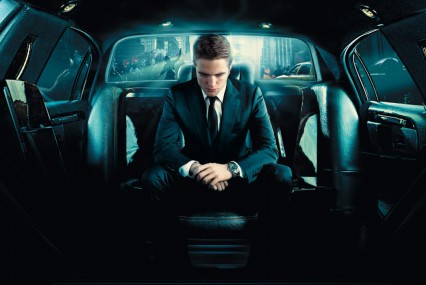Craig Austin reviews Cosmopolis – the latest feature film from David Cronenberg; starring Robert Pattinson, Samantha Morton and Paul Giamatti.
A sole previous attempt to read Don DeLillo’s novella Cosmopolis was somewhat thwarted when I accidentally spilt an entire can of beer on my hardback copy during a flight to – fittingly – New York in the year of its release, 2003. Consequently, the vision and ambition of its celebrated author rests solely, for me at least, on this, David Cronenberg’s celluloid adaptation.
The very fact that DeLillo saw fit to make a recent appearance on Cannes’ red carpet prior to its screening has, perhaps unfairly, increased the expectation of many, though the hackles of many hardcore devotees had already been raised by the casting of goth-lite poster-boy Robert Pattinson in the role of its billionaire protagonist, Eric Packer. In seeking to achieve a quantum leap in the ingrained perceptions of art-house cinemagoers, Pattinson negotiates a precarious artistic path previously trodden by Johnny Depp, River Phoenix, and (less successfully) Charlie from Busted. In this sense, it’s not a wholly unsuccessful venture, though Pattinson’s recent assertion that Cosmopolis is ‘actually a really hopeful movie’ truly stretches credulity. It’s anything but.
Pattinson’s character, his job, his day, his means of communicating with the outside world, perfectly captures the absurdity of what passes for ‘work’ in a 21st century world. Ostensibly on some ill-defined mission to get a haircut, we are invited to join him in the comfort and paranoia of his armour-plated Cadillac as it inches its way through the streets of Manhattan, immune to the chaos, violence and fear that plays out only inches away from its steely bubble of isolation. Cronenberg’s ‘surface is feeling’ aesthetic, an icy urban void of joyless sexual transactions and emotional avoidance, is given free rein throughout and if there is any hidden subtext of hope or human redemption as Pattinson clearly believes then it succeeded only in passing me by.

Cosmopolis
Directed by David Cronenberg
If anything, the timing of this adaptation benefits from its post-financial meltdown milieu. Packer is referred to as being ‘foully and berserkly rich’, and murder as ‘the logical extension of business’. A recurring ‘rat’ motif seeks to replicate the V for Vendetta masks of anti-establishment protest groups the world over, and any hope of love or happiness is crushed beneath the wheels of financial industry. Packer, though recently married, radiates frustration and disillusionment with an already estranged relationship devoid of sexual or emotional intimacy. A scene where Sarah Gadon, as his wife Elise, is seen presenting ‘their’ opinions and desires in the plural is the first glimpse of any absence of power in what has up to that point been a stage-managed depiction of complete control. It sets the scene for what is to follow, as Packer’s gilded existence is incrementally eroded.
In common with many films before it, Cosmopolis feels like a stage-play that doesn’t easily make the transition to the big screen. The two-handed interactions that take place between Packer and the transient passengers who slip in and out of the glacial ether of his Cadillac feel unnecessarily contrived, and though Juliette Binoche delivers an archetypically tremendous (albeit brief) performance the fleeting appearance of Samantha Morton – an exemplary talent – feels like an aside, a squandered afterthought. Paul Giamatti, typecast yet again as a rancorous recluse cast out to the margins of society, is dependably Paul Giamatti but this is the kind of performance he’s been able to phone in since ‘American Splendor’ and frankly, he deserves better.
It’s not that Cosmopolis is a failure; its dialogue often crackles, the depiction of hedge-funders ‘speculating into the void’ being particularly prescient. Pattinson too has his moments, and if this film succeeds partly in shedding a large slice of his Twilight fan-base whose improbable demands can only result in an unwarranted burden of pressure, that may be no bad thing. It simply strikes me as a ‘message’ movie that’s not entirely sure of what its message is meant to be. Either that or I’m no longer the target demographic for the devices of current cinema.
As Binoche’s character contemplates regretfully: ‘I’m 41 years and I understand what is the problem. Life is too contemporary’.












